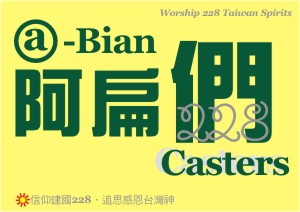Taipei Times - archives
http://help.funp.com/lib/exe/fetch.php/funp/tools/tools_postbtn_script.png?cache=cachePresident Ma Ying-jeou (馬英九) yesterday apologized to victims of the 228 Massacre and their families at a national memorial service marking the 63rd anniversary of the event, saying he hoped the tragedy would become a driving force for the advancement of Taiwan.
2010年2月28日 星期日
no punishment and judgement that is the show
2010年2月26日 星期五
2010年2月22日 星期一
2010年2月13日 星期六
gut of USA
US rejects Beijing’s demand to cancel Dalai Lama meeting AFP, WASHINGTON Sunday, Feb 14, 2010, Page 1 The US has escalated a mounting row on multiple fronts with China, refusing Beijing’s demand to cancel US President Barack Obama’s meeting this week with the Dalai Lama. | |
2010年2月8日 星期一
Democratic liberty is fundamental
Taipei Times - archives
http://help.funp.com/lib/exe/fetch.php/funp/tools/tools_postbtn_script.png?cache=cache
Democratic liberty is fundamental
By Michael DanielsenTuesday, Feb 09, 2010, Page 8
As one of the signatories of the open letter to President Ma Ying-jeou (馬英九) (“An open letter to Taiwan’s president,” Nov. 13, 2009, page 8), I would like to respond to the article by Government Information Office Minister Su Jun-pin (蘇俊賓) (“Taiwan’s political liberties not eroded,” Jan. 26, page 8). I identify a sign of progress in the letter: He states that the government will give “due attention to possible flaws in our judicial system” and continued by stating that it will “keep pushing forward on these fronts.”
I look forward to actual steps that go beyond mere words. Civil liberties are fundamental to democratic nations because they protect the rights and freedoms of its citizens and put limits on governments.
Actions are warranted.
Freedom House’s downgrading of Taiwan’s ranking in terms of civil liberties from 1 to 2 this year signals that the nation is going in the wrong direction, and it is worrisome. I hope Su’s mentioning only of the positive developments in Taiwan’s legal system over the last two decades and avoidance of further comment on what has happened over the last two years — according to Freedom House — is not a sign of self-deception or an argument for avoiding concrete action.
In its report, Freedom House refers to violations of the rights of defendants in criminal cases and other new restrictions on freedom of expression and news freedom. In addition, Jerome Cohen and Chen Yu-jie (陳玉潔) stated in the South China Morning Post on Jan. 20 that now “it [the government] is trying to introduce legislation to punish ‘obstructions of justice’ that will inevitably restrict defense lawyers’ activities.”
Thus, using history over the last two decades to showcase Taiwan’s democratic development is deceptive.
Su seems to have a different understanding of democratic involvement than others. Based on his words, cross-strait relations are only important to the legislature if they are related to law, and the public should only have involvement between elections via the media. However, the agreements involving China and Taiwan deal with the key issue of Taiwan’s future and its existence as a free and democratic nation, and for that reason the agreements are always important to the legislature and the public because of tensions with China and that country’s obvious threats to Taiwan.
During negotiation of agreements that fundamentally affect cross-strait relations, the legislature should be involved directly though a bipartisan committee instead of, as appears to be the case, acting as a rubberstamp parliament that is informed of, but not involved in, the decision-making process.
Taiwan has much to gain through the increased involvement of all parties, including civil society, in cross-strait negotiations. Such a dialogue is essential if there is to be a broad consensus in Taiwan regarding relations with China.
Michael Danielsen is chairman of Taiwan Corner.
This story has been viewed 196 times.
2010年2月6日 星期六
李慶安淚灑記者會說
李慶安與七根竹筍 ◎ 謝又新
李慶安淚灑記者會說:「我絕對不是詐欺犯!」希望司法還她清白。
我 是大安區選民,我要說的是:李市議員、李委員,妳騙了我們十多年,誰還我們公道?打從一開始妳就錯了!竟然還好意思做賊喊抓賊!一點都比不上台東縣議員饒 慶鈴!饒慶鈴也被同黨爆有美國籍,饒慶寧馬上拿出AIT文件自清,所有誣陷她的人全雞嘴變鴨嘴。唯獨,就是妳和馬總統,始終提不出證明,洗刷自己清白。
如今,是法院還人民公道!但是,我要說還是判太輕!妳知不知道一個小老百姓偷挖了七根竹筍要關七個月?妳知不知道台東柑仔店老婦,在不知情下買了五瓶假酒販賣,被罰五萬元?誰比較冤呢?請李慶安妳別得了便宜還賣乖!
正本清源,立法院下會期應盡速通過沒有爭議「國籍法」草案! (作者為大安區龍淵里居民)
標籤: KMT, ma .88. floods.228, Pro-china
2010年2月2日 星期二
this kind of China
Taipei Times - archives
http://help.funp.com/lib/exe/fetch.php/funp/tools/tools_postbtn_script.png?cache=cache
Beijing warns Obama on Dalai Lama meeting
AFP, BEIJING
Wednesday, Feb 03, 2010, Page 1
Beijing yesterday warned US President Barack Obama against meeting the Dalai Lama, saying it would “seriously undermine” Sino-US ties — the latest salvo in an escalating row between the two powers.
Beijing also said no progress was made in the latest round of talks between Chinese officials and envoys of the spiritual leader, saying the two sides remain “sharply divided” on the future of the Himalayan region.
The comments came after the first negotiations between the two sides in more than a year, which wrapped up at the weekend. The envoys of the Dalai Lama returned to their exile base in India on Monday.
The Dalai Lama, whom China accuses of seeking independence for his homeland, is scheduled in the US this month for a visit that includes a stop in Washington, but a meeting with Obama has not been announced.
Such a meeting would “seriously undermine the political foundation of Sino-US relations,” Zhu Weiqun (朱維群), executive vice minister of the Chinese Communist Party body that handles contact with the Dalai Lama, told a news conference.
“If the US leader chooses to meet with the Dalai Lama at this time, it will certainly threaten trust and cooperation between China and the US,” Zhu said.
“We oppose any attempt by foreign forces to interfere in China’s internal affairs using the Dalai Lama as an excuse,” he said.
This story has been viewed 256 times.

